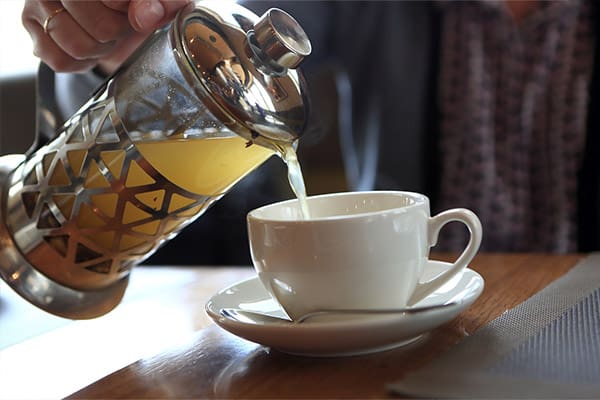
Essiac tea is an herbal mixture some people claim has serious health benefits for cancer patients. However, there is no scientific data to support these claims. Some evidence even indicates Essiac tea may encourage tumors to grow. So it could have the potential to make a patient’s cancer worse.
Many cancer patients seek out alternative treatments and may come across Essiac tea in their search. It can be difficult to sort advertising claims from medical evidence about this herbal mixture. To help patients quickly find the information they need, we compiled a list of key facts about Essiac tea.
Readers can discuss these Essiac facts with their doctors. Cancer patients should consult a licensed physician before making any nutrition or supplement changes. Doctors can explain the risks of Essiac tea and how it may negatively affect individual patients.
1: Essiac Tea Is Not Approved to Treat or Prevent Any Disease
Like many herbal formulas, Essiac tea is marketed as a dietary supplement. The FDA does not regulate supplements as rigorously as drugs. This means manufacturers can sell supplements without demonstrating they can treat or prevent an illness or condition. But they cannot advertise supplements as medical treatments.
Theoretically, a manufacturer could pursue FDA drug approval for Essiac tea. If successful, this type of approval would allow advertising claims about demonstrated health benefits.
According to the National Cancer Institute (NCI), the FDA has not approved Essiac tea for treating any illness. Nor have any manufacturers announced studies or applications about getting FDA approval.
Data Does Not Support Essiac Claims
Some supplements have been studied so extensively that medical experts generally agree they offer certain benefits. Patients may wonder if this could be the case with Essiac tea despite its lack of drug approval.
Multiple studies have been conducted on Essiac tea. Experts have not found any evidence that supports its use as an effective cancer treatment. Research even suggests it could pose serious risks for some patients.
2: Essiac Tea May Help Some Tumors Grow
That’s right. Some research found evidence that Essiac tea can boost tumor growth. Samples of Essiac tea were sent to researchers at Memorial Sloan-Kettering Cancer Center (MSKCC) and the NCI for independent testing. Neither found any evidence of anti-cancer activity. But the NCI did observe negative effects in laboratory animals who were given the tea.
In one study, a version of Essiac was given to rats. At the end of the study, 97% of the rats who drank more concentrated Essiac tea had breast tumors. This group was nearly 20% more likely to have breast tumors than rats who drank plain water.
Researchers concluded this type of Essiac could “promote mammary tumor development” in rats.
Other Essiac studies have also produced concerning results:
- Increased body weight: Researchers saw increased weight in mice exposed to a type of Essiac during prenatal development.
- Lethal toxicity in laboratory animals: In an MSKCC investigation, high concentrations of Essiac killed some laboratory animals. It is unclear how the concentration used in this study compares to that of the regular tea.
Some of the Essiac studies are fairly dated. It is possible the Essiac formulations of today differ from those in the studies mentioned above. Still, no evidence suggests Essiac can provide clear benefits for cancer patients. And it may cause harm.
3: Some Essiac Tea Proponents Encouraged Cancer Patients to Forgo Traditional Treatment
The current manufacturers of Essiac and Flor-Essence® do not take this controversial stance today. But Essiac proponents of the past advised cancer patients not to use any other treatment while taking the tea.
These proponents argued that other cancer treatments would prevent Essiac tea from working. They made these claims even though research had not demonstrated any clear Essiac tea benefits for cancer patients.
No evidence supports Essiac tea as an effective cancer treatment, and experts do not recommend it. Patients undergoing treatment for mesothelioma should consult with their doctors before taking any supplements. The same goes for making any dietary changes or discontinuing any treatments. And this applies to patients with any type of cancer.
Oncologists can help patients understand the risks and benefits of legitimate alternative treatments or herbal therapies. Some herbal medicines, such as those used in Traditional Chinese Medicine (TCM), may help patients manage their cancer symptoms or side effects of treatment. But Essiac tea is ineffective at best, and at worst may cause harm. So patients should feel free to talk to their doctors about skipping this tea.
4: Two Brands of Essiac Tea Claim to Be the Only Legitimate Essiac
Many manufacturers make and sell versions of Essiac tea, but two claim to be the authentic formula. The Flor-Essence formula contains eight herbs. The Original Essiac® formula contains four herbs, most of which are included in Flor-Essence. Despite the manufacturers’ claims, it is unclear whether either of the teas is the authentic version.
Either way, people may hear Essiac tea called “Flor-Essence” or see the two terms used interchangeably. However, it likely does not matter which is the authentic formulation. Neither version has scientific evidence of health benefits for cancer patients.




